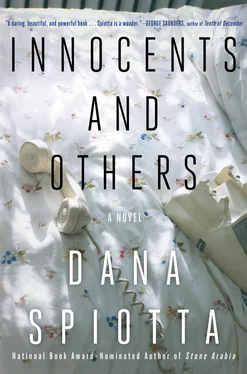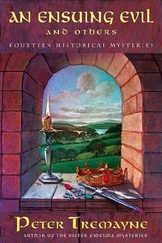“Is that really what they call it? A short list, like the Oscars?” Carrie said. Meadow drove an old Subaru station wagon. The back was filled with lights, microphones, gels, lens cases, and other shooting gear.
“Sure,” Meadow said. “But the Iroquois have their own ideas about who was martyred. The Jesuits cut a swath through here, and there are competing histories standing right next to each other. When you buy a prayer card, you are picking a side, you know.”
“Really? Is it offensive?” Carrie held up the card.
“It’s complicated,” Meadow said. “Did she have a great faith or in converting did she turn her back on her tradition of Long House spiritual practices? Is she the brave orphan who survived smallpox and had a genuine epiphany or is her elevation just the ongoing saga of the spiritual colonization of native peoples?” Meadow gripped the bottom of the steering wheel with one finger while she took a swallow from a can of Diet Dr Pepper. She smiled. “Probably both things are true: she had a conversion and she is a propaganda tool.” Meadow turned up a road heading north, and moved up into the hills above the Mohawk. The air smelled of manure, and the fields were dotted with cows.
“But I must admit what most intrigues me is that her devotion manifested itself with — naturally — lifelong chastity and mortification rituals. They draw her as so pretty on that card, call her ‘Lily.’ But she must have been something in person, disfigured and then continually rending her flesh. This zealous scarred woman hurting herself with hot coals and cat-o’-nine-tails to feel closer to God. Now there’s a woman you could build an interesting film around, right? Like Falconetti’s screen-filling, deep-suffering eyes in Dreyer’s Joan of Arc. ”
“You like it up here,” Carrie said.
“Not Ingrid Bergman’s glam little nun.”
“Never! That hussy.”
“Yes, I do like it,” Meadow said. “Do you remember Drums Along the Mohawk ?”
“No,” Carrie said. “I haven’t seen it.”
“It’s John Ford, 1939. Starring Henry Fonda and Claudette Colbert. So Fonda plays a settler constantly under attack from the Mohawks and the Tories.” Farther up Meadow turned again, and they approached the town of Johnstown. Here farmland gave way to towns with no warning except a wooden sign. The sign said welcome, and then the farms stopped and houses appeared right by the road: a few sadly columned old behemoths, a prefab double-wide, a set-back stone mansion, and a stingy version of a gingerbread Victorian painted all white. The paint was peeling, especially on the sides.
“It’s a very patriotic movie — from the settlers’ point of view, of course — and the interesting part is that Henry Fonda’s family is from that town, Fonda, his relatives were the European settlers who pushed the Five Nations out of there.” Meadow looked over at Carrie. Carrie laughed.
“Really? The same Fondas?” Carrie said. The road bypassed the old downtown, and now the pasture was replaced by a commercial strip that could have been on Route 3 in New Jersey or in the Valley in Los Angeles. A Super 8 motel. McDonalds, Friendly’s, Monro Muffler/Brake, Big Lots discount store, multiple car dealers. Carrie felt the dulling effect of the familiar commercial architecture.
“Are there enough people up here to even bother building these things?” Carrie said.
“I don’t get it either. This is the ugly arterial strip between Johnstown and Gloversville. But the downtowns are old and quite pretty, if deserted.”
Sure enough, Main Street in Gloversville was a series of intact turn-of-the-century storefronts largely empty, ornate cornices attached to limestone back buildings. There were big brick warehouses with large multipane windows, many panes missing and some of the windows covered in wood boards. “It is great that they haven’t torn down these empty warehouses.” The impressive village library was also built of limestone. “Look how grand some of these buildings are. It is shocking next to the rest of this place.”
“It takes money to tear things down. The preservation of poverty, they call it,” Meadow said. “So. Not only the same Fondas, but get this. In 1980, Jane Fonda came up here. On the anniversary of her great-great-great-grandfather’s death by Tory raiders, but also, apparently, to make amends for stealing all the Mohawk land. She may be helping some Mohawks who are trying to reestablish a community here.”
Carrie couldn’t stop herself from tilting her head and raising her eyebrows as she smiled to indicate a cartoonish level of skepticism. “Where did you hear that?” She was used to Meadow making things up, getting them slightly wrong, editing them or exaggerating them in the moment of the telling.
Meadow shrugged. “A Mohawk told me. He described it as a rumor.”
“I thought you said it was the Iroquois?”
“Carrie, come on. Mohawks are Iroquois. The Iroquois Confederacy, or the Five Nations, is made up of the Mohawk, the Seneca, the Oneida, the Onondaga, and the Cayuga.”
“Oh yeah. I guess I should know that.”
“I’ve been filming trains.”
“Trains?”
“All spring. Nothing but trains,” Meadow said. “Do you remember that movie Night Mail ? We saw it in Jay Hosney’s class.”
They pulled up in front of a brick warehouse.
“Of course. That tedious documentary about Scottish mail being delivered.”
Meadow got out and Carrie followed, carrying her backpack and duffel of gear. Meadow went through the open exterior door and then unlocked an interior door that led to a stifling, dusty stairwell. After three flights, she pushed open a wood door with an opaque glass panel and a chain-hinged transom window above that. The studio space consisted of an open warehouse floor. The sun shone through the walls of tiny-paned windows, and the high-ceilinged, huge room was hot and airless.
“Not tedious,” Meadow said. “ Night Mail devotedly follows the mail train as it speeds across the land and through the night.” Meadow had a slightly condescending habit of telling Carrie about movies even if she had seen them. As if Carrie needed them summarized and paraphrased to make sure she “got” it. As if Carrie watched things but had no relationship to them. But Carrie also understood that this was Meadow’s way of thinking. Meadow was building an idea about something, and she liked to think through talking. Once Carrie understood that, she didn’t feel condescended to. She instead felt a pleasing intimacy with Meadow and her great brain. Carrie knew how to be friends with Meadow.
“The train barely stops and we see all the automatic mechanisms to load and unload and sort the mail. It is a machine-age celebration of speed and technology.”
“I remember. There is a poem.”
“Right. An Auden poem, and music by Benjamin Britten. I have been thinking about it.”
“I can see that.”
“The poem and the music complicate the efficiency. Or counter it. Or maybe it is the long focus on only the train — anything looked at that closely becomes mysterious to us.” Meadow turned on a large fan. Some papers blew around, but it felt great on Carrie’s face.
“That’s better! Thank you.”
“It’s a meditation. Or it starts out celebrating and marveling at this unstoppable train. Trying to meet the power of it. But then — as if the filmmaker himself transformed during the night — the film becomes progressively breathless and dark. After all, that 1930s devotion to efficiency did lead to dark places.”
Carrie let the air cool her face, and then she walked around. “So you have been filming the trains as they come through?”
Meadow nodded. “I’ve shot a lot of footage while lying by the tracks as the train passes, filming at ground level. I’ve boarded the train in Amsterdam and stood on the joints between cars as they moved on the tracks. Filmed down through the spaces.”
Читать дальше












